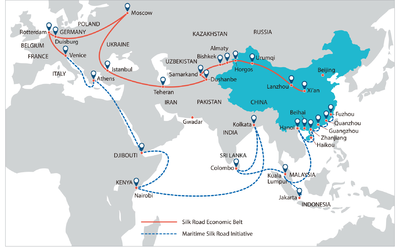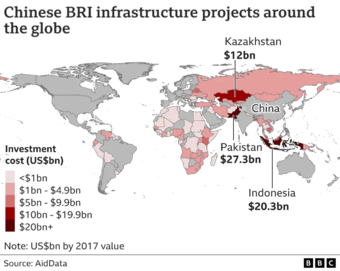Belt and Road Initiative
(geopolitics) | |
|---|---|
 | |
| Interest of | • Kimberley Kitching • Andrew Korybko |
The Belt and Road Initiative (BRI) is a development strategy adopted by the Chinese government in 2013 involving infrastructure development and investments in countries in Europe, Asia and Africa. ("Belt" refers to the overland routes for road and rail transportation, called "the Silk Road Economic Belt"; whereas "road" refers to the sea routes, or the "21st Century Maritime Silk Road.")
A centre-piece of Chinese foreign policy, BRI has developed global trade links over the course of a decade by ploughing some $1 trillion into new roads, ports, railways and bridges. However, BRI has been criticised as a means of providing "predatory loans" in what is labelled "debt-trap diplomacy".[1]
Name change

Until 2016, the initiative was officially known in English as the One Belt and One Road initiative but the official name was changed as the Chinese government considered the emphasis on the word "one" prone to misinterpretation.[2]
Regional connectivity
The Chinese government calls the BRI "a bid to enhance regional connectivity and embrace a brighter future".[3]
The BRI has reached into Africa, Asia, the Indo-Pacific and also the EU. China's Cosco company owns two-thirds of the huge Greek container port at Piraeus and the China Road and Bridge Corporation has built a key bridge in Croatia.
By July 2023, the BRI had total investments crossing an eye popping $1 trillion. Over 150 countries have joined as partners, expanding its geographical scope "from a regional to a near-global initiative."
Western response
The G7 and US responded to BRI by launching a Partnership for Global Infrastructure and Investment (PGII) in 2022, aiming to mobilise $600bn in global infrastructure projects by 2027.[4]
On 10 September 2023, the West agreed at a meeting of the G20 to create an India–Middle East–Europe Economic Corridor (IMEC). IMEC's proposed route connects India to Europe through the United Arab Emirates, Saudi Arabia, Israel and Greece, and is seen by many as a US counter to China's BRI, which connects China with Southeast Asia, Central Asia, Russia and Europe.
In December 2023, the EU revealed details of the Global Gateway scheme, a €300bn (£255bn; $340bn) global investment plan, described as a "true alternative" to China's Belt and Road Initiative. European Commission President Ursula von der Leyen said the EU wanted to show that a different, democratic approach could deliver, external on projects that focused on tackling climate change as well as global health security and sustainable development for developing countries.[5]
References
- ↑ "Can India-Europe corridor rival China's Belt and Road?"
- ↑ "The $900bn question: what is the Belt and Road initiative?"
- ↑ "Chinese revolution could lure overseas investment"
- ↑ "Biden announced a $600 billion global infrastructure program to counter China's clout"
- ↑ "EU launches €300bn bid to challenge Chinese influence"
Wikipedia is not affiliated with Wikispooks. Original page source here